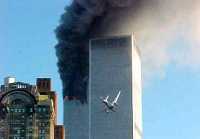
20 Jun World Trade Center 9/11 Dust: Altered Gene Expression Links Exposure to Prostate Cancer Risk
MedicalResearch.com Interview with:

Dr. Taioli
Emanuela Taioli, MD, PhD,
Director of the Institute for Translational Epidemiology
Icahn School of Medicine at Mount Sinai
Asociate director for Population Science
Tisch Cancer Institute
MedicalResearch.com: What is the background for this study? What are the main findings?
Response: An excess incidence of prostate cancer has been identified among World Trade Center responders. We wanted to study if this excess was associated with exposure to WTC dust
The results suggest that respiratory exposure to WTC dust can induce inflammatory and immune responses in prostate tissue. Chronic inflammation could facilitate prostate cancer development
Taken together, our results suggest that World Trade Center prostate cancer cases have a distinct gene expression pattern that may be the result of exposure to specific carcinogens during the WTC attacks. WTC dust-exposed rat prostate displayed unique changes in gene expression and immune cell infiltrates after acute dust exposure, suggesting that the effect of exposure may be measured locally in target organs such as prostate. In addition, some of the genes overexpressed in rat normal prostates as a consequence of exposure are also overexpressed in human prostate cancer tissues, suggesting a link between exposure, local immune dysregulation, and prostate cancer development
MedicalResearch.com: What should readers take away from your report?
Response: Our results provide first line of evidence to support the hypothesis that acute World Trade Center dust exposure through inhalation can profoundly disturb gene expression and immune cell infiltration in the prostate.
MedicalResearch.com: What recommendations do you have for future research as a result of this work?
Response: An interesting question remains about the retention and elimination rates of World Trade Center dust particles and their distribution amongst different organs. The long–lasting inflammatory effect in prostate revealed by our study calls for further study of the exposure effect in other organs such as kidney, thyroid, the central nervous system.
Citation:
[wysija_form id=”3″]
[last-modified]
The information on MedicalResearch.com is provided for educational purposes only, and is in no way intended to diagnose, cure, or treat any medical or other condition. Always seek the advice of your physician or other qualified health and ask your doctor any questions you may have regarding a medical condition. In addition to all other limitations and disclaimers in this agreement, service provider and its third party providers disclaim any liability or loss in connection with the content provided on this website.
Last Updated on June 20, 2019 by Marie Benz MD FAAD
